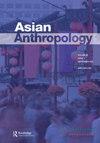Why has wine consumption become popular in Hong Kong? Introducing a new sociocultural paradigm of traditional, aspiring and creative drinkers
Q2 Social Sciences
引用次数: 2
Abstract
Abstract Although Hong Kong has become one of the most valuable wine trading hubs in the world since the withdrawal of the wine duty in February 2008, relatively little is known about how and why local consumers drink wine. Drawing on Bourdieu’s notions of “connoisseur,” “pedant,” and “proletarian,” this article introduces a paradigm of three drinking practices in Hong Kong: established, aspiring and creative. It further introduces the concept of “third indigenization” – the combining of products from two or more places of origin, and subsequently creating a new product in a third place. Methodologically, the analysis of marketing materials, ethnographies, interviews and focus groups conducted in Hong Kong provides a basis for exploring the sociocultural and geographical meanings of wine. This article discusses how wine consumption is popular because it conveys the idea of being globalized, allows the display of wealth, and expresses the idea of having cultural capital. Significantly, this article challenges popular Anglo-Eurocentric understandings of consumption practices and provides a broader and more flexible approach to cultural analysis: it makes conceptual and methodological and contributions to consumer research and to the sociology and geography of wine.为什么香港的葡萄酒消费越来越流行?引入传统、有抱负和有创造力的饮酒者的新社会文化范式
摘要尽管自2008年2月取消葡萄酒税以来,香港已成为世界上最有价值的葡萄酒交易中心之一,但人们对当地消费者如何饮用葡萄酒以及为什么饮用葡萄酒知之甚少。根据布迪厄的“鉴赏家”、“学究”和“无产阶级”的概念,本文介绍了香港三种饮酒方式的范例:既有成就感、有抱负和有创造力。它进一步引入了“第三本土化”的概念——将来自两个或多个原产地的产品结合起来,然后在第三个地方创造新产品。在方法上,对香港市场营销材料、民族志、访谈和焦点小组的分析为探索葡萄酒的社会文化和地理意义提供了基础。本文讨论了葡萄酒消费之所以受欢迎,是因为它传达了全球化的理念,允许财富的展示,并表达了拥有文化资本的理念。值得注意的是,这篇文章挑战了英国-欧洲对消费实践的普遍理解,并为文化分析提供了一种更广泛、更灵活的方法:它对消费者研究以及葡萄酒的社会学和地理学做出了概念和方法论的贡献。
本文章由计算机程序翻译,如有差异,请以英文原文为准。
求助全文
约1分钟内获得全文
求助全文
来源期刊

Asian anthropology
Social Sciences-Anthropology
CiteScore
1.60
自引率
0.00%
发文量
25
期刊介绍:
Asian Anthropology seeks to bring interesting and exciting new anthropological research on Asia to a global audience. Until recently, anthropologists writing on a range of Asian topics in English but seeking a global audience have had to depend largely on Western-based journals to publish their works. Given the increasing number of indigenous anthropologists and anthropologists based in Asia, as well as the increasing interest in Asia among anthropologists everywhere, it is important to have an anthropology journal that is refereed on a global basis but that is editorially Asian-based. Asian Anthropology is editorially based in Hong Kong, Taiwan, and Japan, but welcomes contributions from anthropologists and anthropology-related scholars throughout the world with an interest in Asia, especially East Asia as well as Southeast and South Asia. While the language of the journal is English, we also seek original works translated into English, which will facilitate greater participation and scholarly exchange. The journal will provide a forum for anthropologists working on Asia, in the broadest sense of the term "Asia". We seek your general support through submissions, subscriptions, and comments.
 求助内容:
求助内容: 应助结果提醒方式:
应助结果提醒方式:


